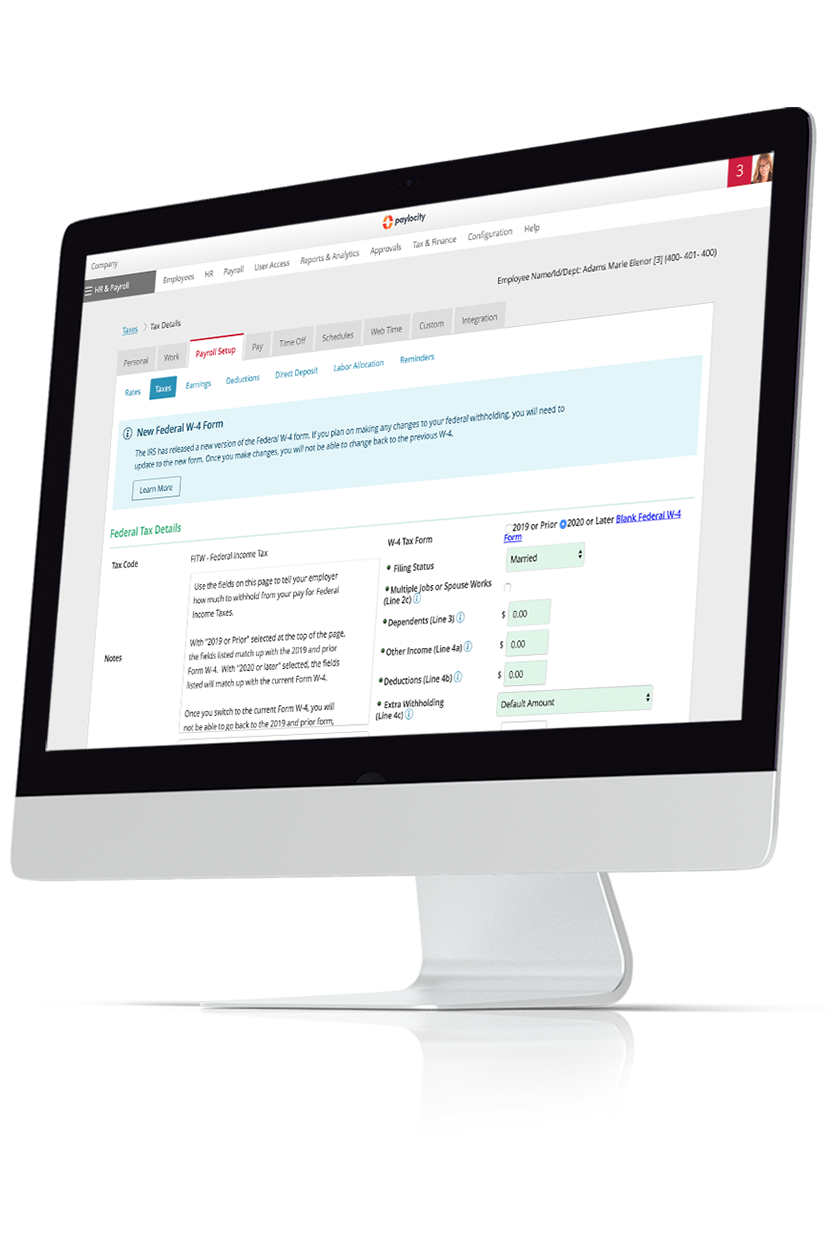resources
An Introduction to Payroll Compliance
May 23, 2024
Explore the most important laws governing payroll and how to keep your organization in compliance.
- Reviewed by Paylocity's Compliance & Government Relations Team

Payroll compliance is a critical part of running a business, governed by complex sets of employment and tax laws. Not only do these laws vary from one region to the next, they also change over time and often impose strict financial penalties or legal repercussions for organizations that don’t fall in line.
In other words, staying on top of the latest legislative updates is crucial for employers of all sizes and industries.
To help navigate this complicated landscape, the following guide will explore the basics and importance of payroll compliance, the main laws organizations must follow, the costs of non-compliance, and best practices for avoiding penalties.
Key Takeaways
- Payroll compliance laws mainly focus on how companies compensate employees, submit taxes, and keep records. They often vary, however, by geographic location and level of authority (i.e., federal vs. state vs. local governments).
- Non-compliance risks heavy fines and penalties, along with potential lawsuits.
- Best practices for ensuring compliance include regularly auditing internal processes, creating a payroll compliance checklist, and investing in payroll compliance software.
What is Payroll Compliance?
Payroll compliance includes a broad range of regulations governing how businesses manage compensation, payroll taxes, and record-keeping. This includes calculating and withholding tax amounts, submitting reports and payments with different tax authorities, abiding by prescribed minimum wage rates, and correctly calculating overtime pay.
Unfortunately, payroll compliance complexities can vary depending on several factors, such as the size and location of the organization, the type of goods or services it provides, and its employee classifications.
Importance of Payroll Compliance
Payroll compliance not only maintains the legal integrity of an organization’s finances but also fosters trust in the workplace by guaranteeing everyone is paid fairly and on time. In turn, this demonstrates the organization’s commitment to ethical practices and strengthens its reputation within its industry.
Conversely, not adhering to labor laws and payroll tax compliance requirements can incur expensive penalties, fines, lawsuits, and even criminal charges in some states. The negative sentiment and backlash resulting from any of these can further impact employee turnover and recruiting efforts.
Payroll Compliance Basics
While payroll compliance laws and regulations are varied, maintaining compliance often boils down to a few key tasks:
- Accurately calculating payroll
- Correctly classifying employee work statuses (e.g., exempt vs non-exempt)
- Paying employees on time
- Correctly filing government tax forms
- Remitting payroll deductions to the right government agency
Regardless of an organization’s size or industry, all companies are subject to the tax and labor laws for their area. Moreover, if an organization exists across multiple branches in different states, the company must similarly adhere to the applicable laws for each location.
Payroll Recordkeeping Requirements
Payroll compliance doesn’t end when all the required forms and amounts are submitted. Some federal and state laws also require employers to retain a copy of all payroll records (e.g., pay stubs, tax payment receipts, and timekeeping reports) for a certain number of years after hire or termination.
For example, federal law requires employers to keep payroll and employment records for at least three years.
Learn More: Deciphering the Data: An Introduction to Payroll Reports
What is Payroll Governance?
Payroll compliance doesn’t have a “one-size-fits-all” approach since the governing labor and payroll laws vary so widely. With that in mind, here are some of the most common laws employers are likely to encounter.
Federal and International Compliance
In addition to submitting federal income taxes, most organizations within the U.S. must follow a mix of labor and payroll tax compliance mandates from the Internal Revenue Service (IRS), Department of Labor (DOL), and Equal Employment Opportunity Commission (EEOC).
| Legislation | Compliance Details |
| Federal Insurance Contributions Act (FICA) | Each pay period, employers and employees must pay Social Security and Medicare taxes. |
| Federal Unemployment Tax Act (FUTA) | Employers also pay unemployment taxes each pay period to help fund programs and benefits for unemployed citizens. |
| Fair Labor Standards Act (FLSA) | Employers must adhere to several compensation standards, including minimum wage rates, child labor protections, overtime requirements, and recordkeeping mandates. |
| Equal Pay Act (EPA) | Employers aren’t allowed to pay women and men substantially different wages for performing similar work. |
Large corporations and conglomerates with a global presence also must comply with payroll regulations native to each country in which they operate.
| Country/Region | Compliance Laws |
| Canada | The Canada Labor Code applies to all businesses that operate across Canadian provinces. Employers who only function within a single province, however, are only subject to the laws of that province. |
| Mexico | Mexico has both labor laws and employment laws that focus on different working relationships. Mexico’s constitution deals with the broad employment laws governing a worker’s relationship with their employer, but the Federal Labor Law is a subset of requirements specifically focused on how employers interact with unionized groups of workers. |
| European Union / United Kingdom | On top of the E.U.’s Working Time Directive, which sets limits on the number of hours a week an employee can work along with minimum requirements for break periods and paid leave, the U.K. also has the Employment Rights Act, which provides broader employment mandates (e.g., employment contracts, termination requirements, etc.) |
State and Local Compliance
States and large cities often have their own sets of payroll requirements, ranging from minimum wage rates to final paycheck standards. Employers need to familiarize themselves with each state’s unique tax laws, but some common types of legislation include:
- Reciprocal Agreements
- Supplemental Income Taxes
- State Unemployment Insurance (SUI) Taxes
- Paid Sick Leave Taxes
- Paid Time Off (PTO) Payout Standards
The Dangers of Non-Compliance
Failing to maintain compliance with any of the laws mentioned above can be disastrous. Not only can it incur significant fines or penalties, but it also risks even more expensive lawsuits.
Common Payroll Mistakes
With so many different laws and regulations to follow, it’s not surprising there are multiple ways a company can accidentally risk non-compliance. Some of the most common payroll mistakes include:
- Misclassifying workers, such as an independent contractor from employees.
- Not using the correct tax forms, such as the current Form W-2 or the correct state Form W-4.
- Not using current tax withholding rates based on IRS and/or state government updates.
- Incorrectly calculating overtime wages.
- Incorrectly tracking the amount of hours an employee worked.
Non-Compliance Penalties
Delayed or inaccurate tax filings can incur penalties based either on the size of the tax itself (i.e., an additional 10% of the owed amount) or on how long it takes the organization to submit everything correctly.
Additionally, agencies like the DOL can take legal action against a noncompliant company that results in millions of dollars in fines and damages. For example, in fiscal year 2023 alone, the DOL’s Wage and Hour Division (WHD) recovered over $274 million in back wages and damages.
How to Avoid Non-Compliance
As stressful as payroll compliance can be, there are a few options organizations can use to ensure they never end up in a precarious position.
Payroll Compliance Best Practices
- Keep A Compliance Calendar: Keep an updated, sharable calendar with all important legal and tax deadlines or due dates, as well as when each pay period begins and ends.
- Audit Regularly: Perform recurring audits to make sure all information and records are accurate and stored properly. Test the payroll process as well to ensure funds and withholdings go where they’re supposed to when they’re supposed to.
- Stay Informed: Track and research all applicable legislative changes or regulatory updates. Whether it’s a new federal law or a change in a state tax rate, set reminders to verify current guidance and processes are still based on the most up-to-date laws.
- Use a Payroll Compliance Checklist: Create and implement a payroll compliance checklist the entire company can access and review. It should include every tax and compliance-related task, such as calculating withholdings, confirming employee classifications, meeting submission deadlines, updating tax information, etc.
- Consult the Experts: It doesn’t hurt to have extra assistance from a payroll compliance practitioner or specialist. Third parties can sometimes catch nuances or details internal staff miss or don’t know about. This is especially helpful for smaller or middle-sized businesses that don’t have enough resources yet to create a team of internal specialists.
Payroll Compliance Software
One of the most efficient ways to avoid non-compliance is to invest in payroll compliance software. Specifically, integrated platforms with tools dedicated to:
- Uploading and storing important documents
- Recording and verifying a worker’s employment status or tax information
- Calculating correct tax withholdings
- Applying the latest legislative updates
Additionally, look for software solutions that allow employees to easily access, review, and update their information, while also fiercely protecting that information from outside threats.

Get Taxes Done Right, Without the Stress
We know there's a lot that goes into preparing and filing payroll tax forms. Save time and get support from our expert team. As a Registered Reporting Agent with the IRS, we can help prepare and file all the necessary forms you need to remain compliant - even in the face of changing legislation. Learn more here.



